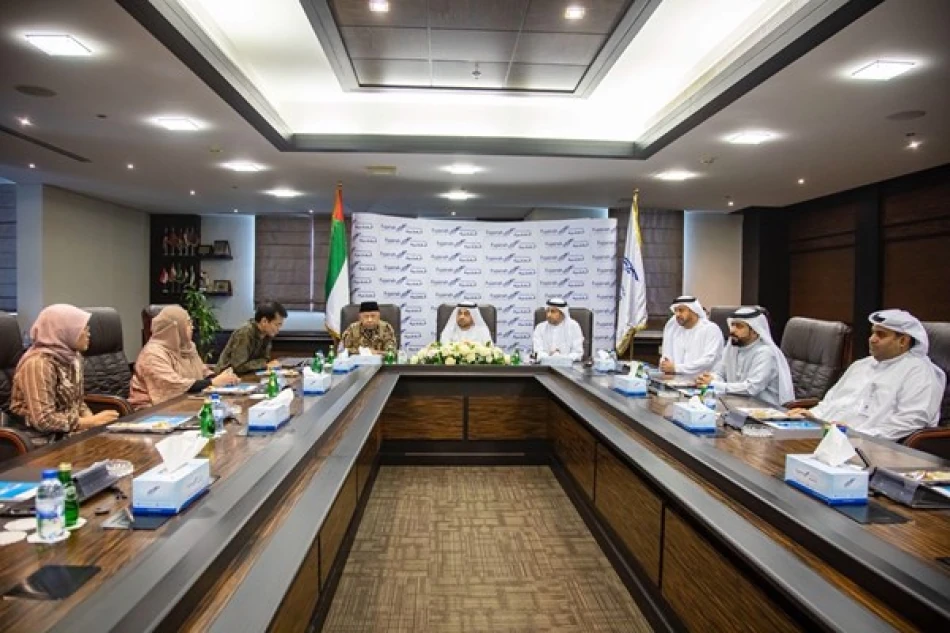
Fujairah Chamber Explores Strategies to Bolster UAE-Indonesia Trade Ties
Fujairah Courts Indonesian Investment as UAE Expands Southeast Asian Economic Ties
The Fujairah Chamber of Commerce is actively pursuing deeper business relationships with Indonesia, signaling the UAE's strategic pivot toward Southeast Asian markets amid global economic realignment. With bilateral trade already exceeding AED 58 million in 2024, the emirate is positioning itself as a gateway for Indonesian mining giants and other businesses seeking Middle Eastern market access.
Strategic Timing for UAE-Indonesia Partnership
The meeting between Sheikh Saeed bin Suroor Al Sharqi, Chairman of the Fujairah Chamber of Commerce and Industry, and Indonesian Ambassador Hussein Baqis reflects broader geopolitical and economic trends. As global supply chains diversify away from traditional Western-dominated routes, the UAE is capitalizing on its geographic position between Asia and Europe.
This outreach comes as Indonesia, the world's fourth-most populous nation, seeks to leverage its massive natural resource wealth beyond traditional export markets. The timing aligns with Indonesia's push to add value to its raw material exports rather than simply shipping commodities abroad.
Fujairah's Investment Appeal
Infrastructure and Regulatory Advantages
Sultan Jamea Al Hindasi, Director General of the Chamber, highlighted Fujairah's key selling points: streamlined licensing processes, modern infrastructure, and comprehensive business support services. These advantages mirror successful free zone models in Dubai and Abu Dhabi, but with potentially lower competition and costs.
The emirate's strategic location on the UAE's east coast, facing the Indian Ocean, makes it particularly attractive for Asian businesses seeking to establish regional headquarters or distribution centers.
Current Trade Foundation
The existing AED 58 million trade volume between Fujairah and Indonesia, while modest, provides a solid foundation for expansion. This figure likely represents significant untapped potential, given Indonesia's status as Southeast Asia's largest economy and its growing middle class of over 50 million people.
Indonesia's Mining Sector: A Strategic Opportunity
Ambassador Baqis emphasized Indonesia's dominance in global mining, particularly in coal, gold, tin, copper, and nickel production. This focus is particularly relevant given the global energy transition and Indonesia's position as a critical supplier of battery metals like nickel.
Indonesia's mining sector growth presents multiple opportunities for UAE-based companies, from equipment supply and financing to downstream processing and trading. The country's recent policies requiring local processing of raw materials before export could create demand for UAE expertise in industrial development.
Market Implications and Broader Context
This diplomatic engagement reflects the UAE's systematic approach to economic diversification beyond oil dependency. Similar to Singapore's historical role as a business hub for Southeast Asia, the UAE is positioning itself as the regional headquarters location of choice for companies expanding between Asia and the Middle East.
For investors, this signals potential opportunities in logistics, manufacturing, and financial services sectors that typically benefit from increased bilateral trade. The focus on mining also suggests growing demand for specialized industrial services and equipment.
Looking Forward: Sustainable Partnership Potential
The emphasis on mutual economic development suggests this partnership could extend beyond traditional trade relationships. Indonesia's young, tech-savvy population and the UAE's advanced financial infrastructure create opportunities for collaboration in fintech, e-commerce, and digital services.
The success of this initiative will likely depend on concrete follow-up actions, including trade missions, investment facilitation programs, and possibly formal economic partnership agreements. Given both countries' commitment to economic diversification, the foundation appears solid for sustained growth in bilateral relations.
Most Viewed News

 Layla Al Mansoori
Layla Al Mansoori






